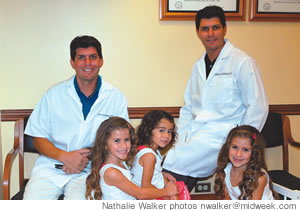
Double The Dental Care
March 02, 2011
By Drs. Nicholas And Peter Kyriakakis


Drs. Nicholas And Peter Kyriakakis
Dentists and owners of Gemini Dental Center
Where did you receive your schooling and training?
Nick: I graduated from the University of Scranton in ‘96 with a bachelor’s in science and biology and a minor in philosophy. Then I went to the University of Medicine and Dentistry. I did a one-year general hospital residency at Bellevue Hospital in Manhattan.
Peter: I went to the University of Scranton and studied biophysics. I went to the University of Medicine and Dentistry. I did my general practice residency at Coler-Goldwater Hospital and that included seven months in oral surgery at the Bellevue Hospital department of oral surgery.
How long have you been practicing?
Nick: This is my 10th year. Peter: Eleven years.
{embed=“elements/box_ad”}
At what age should dental care begin?
Nick: Children should be seen as soon as they have teeth. We can help them with hygiene, prevention and fluoride prescriptions.
Peter: We opened Gemini Dental Center in 2003 (formerly named Da Vinci Dental Center) and we do family dentistry, so we see the whole family - husband, wife, kids, everybody can come in. There are two of us and we have a lot of room, so we’re able to see the whole family at once. We’re open on Saturdays, too, all day.
Anything special that you do?
Peter: We participate with most insurance, pretty much all of them. We have flexible payment plans. We try to accommodate our patients. People do come here for elective treatment, but most of it is health care, so we have to find a way for them to get it done.
Nick: We’re very accessible. Come in and we’ll give you an appointment right away. We’re not put off by emergencies. We like to see you when you’re in pain - we’ll bring you in and make you feel better that day. We have a lot of empathy. That’s one of our biggest things - our emergency patients always have nice things to say.

|
Do patients have a hard time telling you apart?
Nick: Since we look the same and we sound the same, we have monogrammed uniforms.
Can you say something about preventative care?
Peter: It’s good that people come in and get checkups, because if we don’t correct small problems early they get worse. People think, well, I’ll just fix it later, but it ends up being more expensive and not as ideal of a repair. Getting a small filling is much better than having a root canal, which is not just expensive, it increases the likelihood that you will have problems in the scheme of your dental life. If you follow the directions of your dentist, nowadays you should be able to have your teeth your whole life. Although we take teeth out all the time, we prefer not to.
There’s no fluoride in the water in the state so people have a lot more cavities than others. We’re from New Jersey and they do have cavities there, but it’s still fewer than here because there’s no fluoride in the water. The teeth decay at a higher rate because of the lack of fluoride.
Nick: Basically, we’ve really got to decrease these cavities, and fluoride is introduced into people’s drinking supply so that everybody has a fair shake at having nice teeth.
How much has the economy affected your practice?
Nick: With the bad economy we’re seeing a lot of people coming in for emergencies, but they should be coming in for checkup cleanings to make sure everything’s OK. Waiting until they have to have a major procedure ends up costing them more and is a lot more painful and invasive.
Peter: We see it all the time. People come in with an emergency and we open up their X-rays and it says 2006 and we’re like uh, oh. We can see the timeline of the problem because we’ve been here now for eight years.
{embed=“elements/google_ad336x280”}
What are some of the bigger issues you see in Hawaii?
Peter: We see a lot of betel nut - people chew betel nut. They mix it with tobacco and other things. When they chew it, it causes a chemical reaction and you spit this red stuff out.
Nick: It mixes with the tobacco which has nicotine, and it gives them a feeling of euphoria, but it has a high turnover of oral cancer - much higher than chewing tobacco.
Anything else you see a lot?
Peter: We see a lot of people with problems from substance abuse, mostly from taking methamphetamines - “ice.” That lifestyle in general causes a lot of decay and they have this term for it: “meth mouth.” They open their mouth and you see the teeth decayed to the gum line. Their teeth are not gone just because of the drugs. Their mouths get dry and the thirsty user tends to drink large amounts of sugary drinks. They neglect their teeth and then come in and have just the roots remaining. Often, we remove unrestorable teeth and make dentures for them. The results are very gratifying and improve quality of life.
Nick: And we do reconstruction. We also do root canals really well here. One thing that’s nice about our office is people can come in and get a lot of things taken care of. Of course, if there’s a need for a specialist, we always recognize that. We know the limits of our treatment. We’ve been doing this a long time. It’s always funny when we say that because we look pretty young, but we have been doing this a long time. We went to school and we did residency, so it’s going on 15 years.
Do you ever consult each other?
Both: All the time.
Nick: We ask for the patient’s permission first.
Peter: A second opinion can be quite helpful.